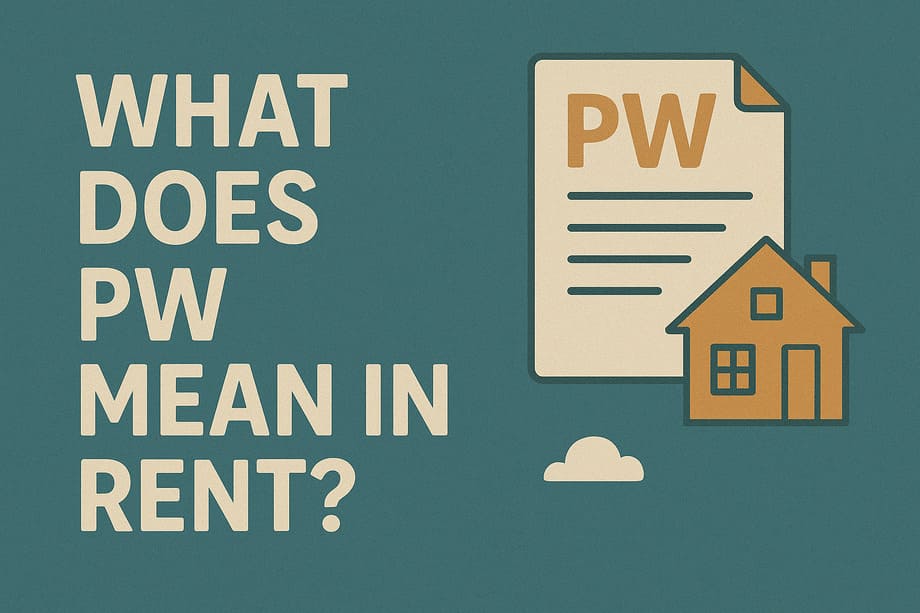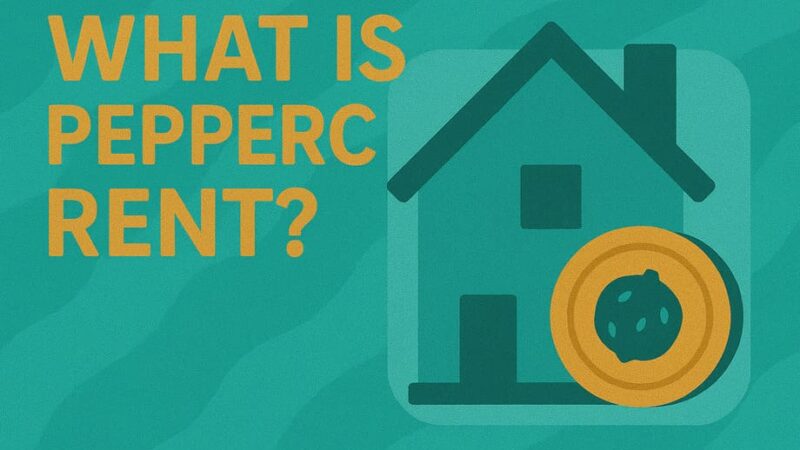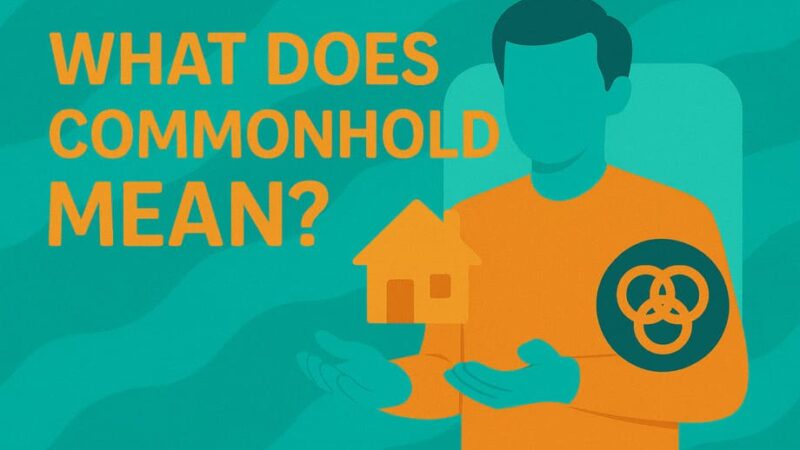What Does PW Mean in Rent?

If you’re searching for rental properties and keep seeing “PW” next to the rent price, you might be wondering what it stands for. It’s a common question, especially for first-time renters or students looking at accommodation.
PW stands for Per Week. It’s the amount of rent you pay every week, typically on the same day each week. Unlike monthly rent (PCM), weekly rent means you make 52 payments throughout the year rather than 12.
Let’s break down everything you need to know about PW rent and how it compares to other payment options.
What Does PW Mean?
PW = Per Week
When you see a property advertised at £200 PW, it means you’ll pay £200 every week on a set day—usually Monday or the day you moved into the property.
The payment stays consistent each week:
- Every Monday: £200
- Every Monday: £200
- Every Monday: £200
Unlike monthly rent where you pay once per month, PW rent means you’ll make a payment every single week of the year.
Quick Example:
You rent a room for £150 PW, with rent due every Thursday:
- First Thursday: £150
- Second Thursday: £150
- Third Thursday: £150
- Fourth Thursday: £150
You’ll pay this amount 52 times per year (52 weeks in a year), totalling £7,800 annually.
Who Uses PW Rent?
Weekly rent payments are less common than monthly (PCM) rent in the UK, but they’re popular in certain situations:
Student accommodation – Many student properties use weekly payments to align with term times and student loan payments.
House shares and HMOs – Landlords with multiple tenants sometimes prefer weekly payments for easier cash flow management.
Short-term lets – Properties offered on flexible or short-term contracts often use weekly payments.
Budget accommodation – Lower-cost rentals sometimes use weekly payments as they feel more manageable to tenants on tight budgets.
Seasonal workers – Areas with seasonal employment (tourist areas, agricultural regions) often see weekly rentals.
Most standard long-term tenancies in the UK use monthly (PCM) rent rather than weekly, but PW is common enough that you’ll see it regularly when property hunting.
PW vs PCM: What’s the Difference?
Property listings often show both PW and PCM to help you compare. Here’s what distinguishes them:
PW (Per Week)
- Pay rent every week (52 payments per year)
- Common for student accommodation and short-term lets
- Payments usually due on the same day each week
- Can feel more manageable for weekly budgets
PCM (Per Calendar Month)
- Pay rent once per month (12 payments per year)
- Most common for standard tenancies
- Payments usually due on the same date each month (e.g., 1st or 5th)
- Matches monthly salary payments for most employees
Side-by-Side Comparison:
| Feature | PW (Per Week) | PCM (Per Calendar Month) |
|---|---|---|
| Payment frequency | Weekly (52 times/year) | Monthly (12 times/year) |
| Common for | Students, short-term | Long-term tenancies |
| Budgeting style | Weekly expenses | Monthly expenses |
| Admin | More transactions | Fewer transactions |
Important: Just because a property shows a PW rate doesn’t necessarily mean you’ll pay weekly. Most long-term tenancies still require monthly payments, the weekly figure is just shown for comparison. Always check your actual tenancy agreement.
How to Convert PW to PCM
The most important calculation for renters: figuring out what weekly rent actually costs per month.
The Formula:
(Weekly Rent × 52) ÷ 12 = Monthly Rent (PCM)
Step-by-Step Example:
A flat is advertised at £200 PW. What’s the monthly cost?
- Multiply by 52 weeks: £200 × 52 = £10,400 (annual rent)
- Divide by 12 months: £10,400 ÷ 12 = £866.67 PCM
So £200 per week equals approximately £867 per calendar month.
Common Mistake to Avoid:
Never multiply weekly rent by 4 to estimate monthly cost. While it seems logical (roughly 4 weeks per month), this seriously underestimates the real amount.
Wrong: £200 × 4 = £800 PCM (underestimates by £67!)
Correct: £200 × 52 ÷ 12 = £867 PCM
This mistake can throw your budget off by hundreds of pounds annually, so always use the proper formula.
Quick Conversion Table:
| Weekly (PW) | Monthly (PCM) | Annual |
|---|---|---|
| £75 | £325 | £3,900 |
| £100 | £433 | £5,200 |
| £125 | £542 | £6,500 |
| £150 | £650 | £7,800 |
| £175 | £758 | £9,100 |
| £200 | £867 | £10,400 |
| £225 | £975 | £11,700 |
| £250 | £1,083 | £13,000 |
| £300 | £1,300 | £15,600 |
How to Convert PCM to PW
Sometimes you want to work backwards, converting monthly rent to a weekly figure.
The Formula:
(Monthly Rent × 12) ÷ 52 = Weekly Rent (PW)
Example:
A property costs £800 PCM. What’s the weekly cost?
- Multiply by 12 months: £800 × 12 = £9,600 (annual rent)
- Divide by 52 weeks: £9,600 ÷ 52 = £184.62 PW
So £800 per month equals roughly £185 per week.
This helps if you’re paid weekly and want to understand rental costs in weekly terms.
Does PW Rent Include Bills?
Usually not. Like PCM rent, weekly rent typically covers only the property itself unless explicitly stated otherwise.
What You’ll Usually Pay Extra:
- Gas and electricity
- Water
- Council tax
- Internet/broadband
- TV licence
When Bills Might Be Included:
Some PW rentals do include utilities, particularly:
- Student accommodation – Often includes utilities and sometimes internet
- House shares – Landlords may include bills for simplicity
- All-inclusive rentals – Some properties advertise as “bills included”
Always check your tenancy agreement. If bills are included, confirm exactly which ones are covered and whether there are usage limits.
Advantages of PW Rent
Smaller Regular Payments
Weekly payments can feel more manageable than one large monthly payment, especially if you’re on a tight budget.
Suits Weekly Pay Cycles
If you’re paid weekly, PW rent aligns perfectly with your income schedule.
Flexibility for Short-Term Stays
Weekly payments suit temporary or short-term accommodation where you might not be staying for full months.
Easier Mental Budgeting
Some people find weekly expenses easier to track and manage than monthly costs.
Disadvantages of PW Rent
More Admin
52 payments per year means 52 transactions to manage, set up, and track—significantly more than 12 monthly payments.
Can Feel More Expensive
Psychologically, paying rent every single week can feel more burdensome than paying once per month.
Less Common for Long-Term
Most standard tenancies use monthly payments. Weekly rent is less common for traditional 6-12 month tenancy agreements.
Notice Periods Differ
Your notice period requirements may differ with weekly vs monthly tenancies. Weekly tenancies often require less notice, but this varies.
When Is Rent Due with PW?
With weekly rent, payment is usually due on the same day each week:
Common rent days:
- Monday (most common)
- The day you moved in (e.g., if you moved in on a Thursday, rent is due every Thursday)
- The day specified in your tenancy agreement
Unlike monthly rent where you might pay on the 1st, 5th, or another date of the month, weekly rent follows the days of the week rather than calendar dates.
Set up a standing order to automate weekly payments. This ensures you never miss a payment and saves you from manually transferring money every single week.
How Much Weekly Rent Can You Afford?
The same affordability principles apply to weekly rent as monthly: aim to spend no more than 30% of your income on rent.
Weekly Income Calculation:
If you earn £2,000 per month:
- Monthly income: £2,000
- Weekly income: (£2,000 × 12) ÷ 52 = £461.54 per week
- 30% for rent: £461.54 × 0.30 = £138 PW maximum
Quick Affordability Guide:
| Weekly Income | 30% for Rent | Affordable PW |
|---|---|---|
| £250 | £75 | Up to £75 PW |
| £350 | £105 | Up to £105 PW |
| £450 | £135 | Up to £135 PW |
| £550 | £165 | Up to £165 PW |
Remember, this is before adding bills. Budget for an extra £60-£100 per week for utilities and council tax on top of rent.
Which Should You Choose: PW or PCM?
The choice often isn’t yours—landlords specify the payment structure. However, if you have options:
Choose PW if you:
- Are paid weekly and want to match your income cycle
- Prefer smaller, more frequent payments
- Are looking for short-term or flexible accommodation
- Find weekly budgeting easier to manage
Choose PCM if you:
- Are paid monthly (like most UK employees)
- Want fewer transactions and less admin
- Are signing a standard long-term tenancy
- Prefer managing finances on a monthly basis
Most long-term rental properties in the UK default to PCM regardless of how they’re advertised, so always check your actual tenancy agreement for payment terms.
Frequently Asked Questions
What does PW mean in rent?
PW stands for Per Week. It’s the amount of rent you pay every week on a set day (usually Monday or your move-in day). For example, £200 PW means you pay £200 every single week, totalling 52 payments per year. PW rent is common for student accommodation, house shares, and short-term lets, though less common than monthly (PCM) rent for standard tenancies.
How do I convert weekly rent to monthly?
Use this formula: (Weekly Rent × 52) ÷ 12 = Monthly Rent. For example, £175 PW equals (£175 × 52) ÷ 12 = £758 PCM. Never multiply weekly rent by 4 to estimate monthly cost, as this underestimates the true amount, most months have 4.3 weeks, not exactly 4.
Is weekly rent cheaper than monthly?
No, PW and PCM are just different ways of expressing the same total cost. A property at £200 PW costs the same annually as one at £867 PCM (£10,400 per year). The payment frequency differs, but the total rent paid is identical. Choose based on which payment schedule suits your income cycle, not which seems cheaper.
Key Takeaways
PW means Per Week – rent paid every week on the same day, totalling 52 payments annually. It’s common for student accommodation, house shares, and short-term lets.
Convert properly – Use (Weekly Rent × 52) ÷ 12 to calculate monthly cost. Never multiply by 4, as this underestimates by up to £100+ per month.
PW vs PCM is just payment frequency – The total annual cost is the same regardless of whether you pay weekly or monthly. Choose based on which suits your budget cycle.
Most tenancies use PCM – Even if a property shows a PW rate, your tenancy agreement may still require monthly payments. Always check the actual contract terms.
Set up automatic payments – Whether weekly or monthly, automate rent with a standing order to avoid missed payments.
Understanding PW rent helps you accurately compare properties and budget effectively, whether you’re a student looking at accommodation or considering a short-term let.
Last Updated on October 22, 2025 by James Cartwright







